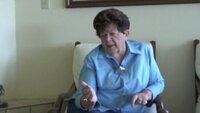| Title |
Walker, Olene OH9_021 |
| Creator |
Weber State University, Stewart Library: Oral History Program |
| Contributors |
Walker, Olene, Interviewee; Langsdon, Sarah, Interviewer; Lynne, Kimberly, Technician |
| Collection Name |
Weber and Davis County Community Oral Histories |
| Description |
The Weber and Davis County Communities Oral History Collection includes interviews of citizens from several different walks of life. These interviews were conducted by Stewart Library personnel, Weber State University faculty and students, and other members of the community. The histories cover various topics and chronicle the personal everyday life experiences and other recollections regarding the history of the Weber and Davis County areas. |
| Abstract |
The following includes the transcript and video clips from an oral history interview with Olene Smith Walker, former governor of the state of Utah from 2003 to 2005. |
| Image Captions |
Olene Walker |
| Subject |
Governor; Public service; Women in politics |
| Digital Publisher |
Stewart Library, Weber State University, Ogden, Utah, USA |
| Date |
2012 |
| Date Digital |
2015 |
| Temporal Coverage |
1930; 1931; 1932; 1933; 1934; 1935; 1936; 1937; 1938; 1939; 1940; 1941; 1942; 1943; 1944; 1945; 1946; 1947; 1948; 1949; 1950; 1951; 1952; 1953; 1954; 1955; 1956; 1957; 1958; 1959; 1960; 1961; 1962; 1963; 1964; 1965; 1966; 1967; 1968; 1969; 1970; 1971; 1972; 1973; 1974; 1975; 1976; 1977; 1978; 1979; 1980; 1981; 1982; 1983; 1984; 1985; 1986; 1987; 1988; 1989; 1990; 1991; 1992; 1993; 1994; 1995; 1996; 1997; 1998; 1999; 2000; 2001; 2002; 2003; 2004; 2005; 2006; 2007; 2008; 2009; 2010; 2011; 2012 |
| Item Size |
77p.; 29cm.; 2 bound transcripts; 4 file folders. 4 video discs: digital; 4 3/4 in. |
| Medium |
oral histories (literary genre) |
| Spatial Coverage |
Ogden, Weber County, Utah, United States, http://sws.geonames.org/11788968, 41.22809, -111.96766 |
| Type |
Text; Image/MovingImage |
| Conversion Specifications |
Filmed using a Sony HDR-CX430V digital video camera. Sound was recorded with a Sony ECM-AW3(T) bluetooth microphone. Transcribed using WAVpedal 5 Copyrighted by The Programmers' Consortium Inc. Digitally reformatted using Adobe Acrobat Xl Pro. |
| Language |
eng |
| Rights |
Materials may be used for non-profit and educational purposes, please credit University Archives, Stewart Library; Weber State University. |
| Source |
Walker, Olene OH9_021; Weber State University, Stewart Library, University Archives |
| Format |
application/pdf; video/mp4 |
| ARK |
ark:/87278/s6w67x0n |
| Setname |
wsu_webda_oh |
| ID |
104144 |
| Reference URL |
https://digital.weber.edu/ark:/87278/s6w67x0n |
| Title |
Walker, Olene OH9_021 |
| Creator |
Weber State University, Stewart Library: Oral History Program |
| Contributors |
Walker, Olene, Interviewee; Langsdon, Sarah, Interviewer; Lynne, Kimberly, Technician |
| Description |
The Weber and Davis County Communities Oral History Collection includes interviews of citizens from several different walks of life. These interviews were conducted by Stewart Library personnel, Weber State University faculty and students, and other members of the community. The histories cover various topics and chronicle the personal everyday life experiences and other recollections regarding the history of the Weber and Davis County areas. |
| Image Captions |
Olene Walker |
| Biographical/Historical Note |
The following is an oral history interview with Olene Smith Walker, former governor of the state of Utah from 2003 to 2005. Governor Walker discusses her early years growing up in Weber County with her parents Thomas and Nina Smith. She then talks about her decision to run for the Utah State Legislature and her eight year tenure, her time as lieutenant governor under Michael Leavitt, and her term as Utah governor. The interview was conducted in the St. George, Utah home of Governor Walker on July 5-6, 2012 by Sarah Langsdon. |
| Subject |
Ogden (Utah); Weber County; Governor; Public service; Women in politics |
| Digital Publisher |
Stewart Library, Weber State University, Ogden, Utah, USA |
| Date |
2012 |
| Date Digital |
2015 |
| Temporal Coverage |
1930-2012 |
| Item Size |
77p.; 29cm.; 2 bound transcripts; 4 file folders. 4 video discs: digital; 4 3/4 in. |
| Medium |
oral histories (literary genre) |
| Spatial Coverage |
Ogden, Weber County, Utah, United States, http://sws.geonames.org/11788968, 41.22809, -111.96766 |
| Type |
Text |
| Conversion Specifications |
Filmed using a Sony HDR-CX430V digital video camera. Sound was recorded with a Sony ECM-AW3(T) bluetooth microphone. Transcribed using WAVpedal 5 Copyrighted by The Programmers' Consortium Inc. Digitally reformatted using Adobe Acrobat Xl Pro. |
| Language |
eng |
| Rights |
Materials may be used for non-profit and educational purposes, please credit University Archives, Stewart Library; Weber State University. |
| Source |
Walker, Olene OH9_021; Weber State University, Stewart Library, University Archives |
| Format |
application/pdf |
| Setname |
wsu_webda_oh |
| ID |
104351 |
| Reference URL |
https://digital.weber.edu/ark:/87278/s6w67x0n/104351 |













